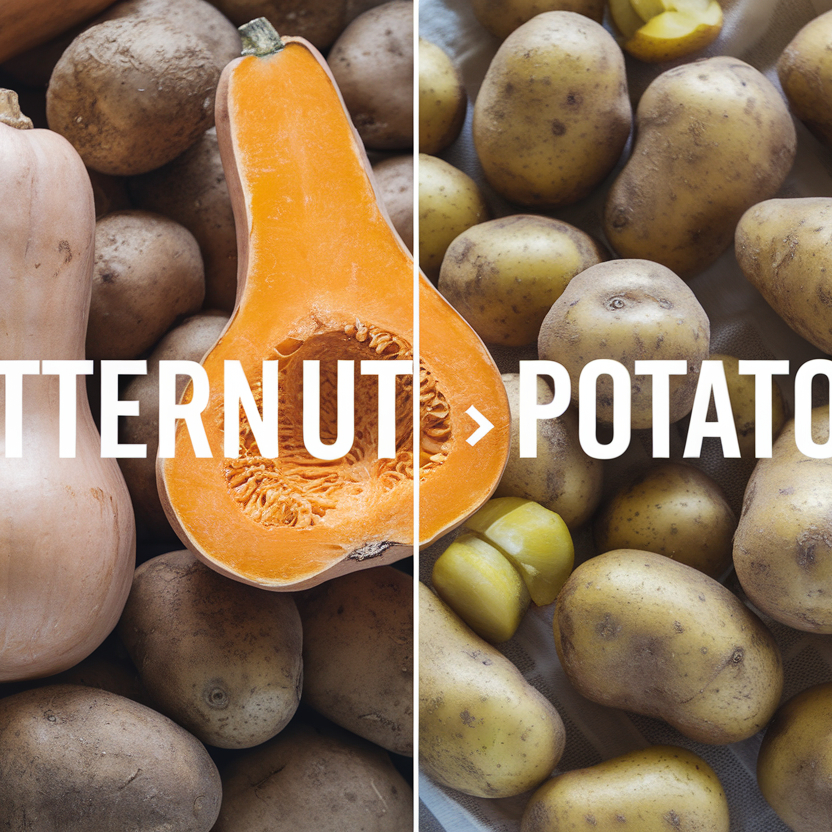With the rise of low-carb and ketogenic diets, many people are paying closer attention to the carb content in everyday foods. One common question is whether butternut squash is a better low-carb option than the classic potato. In this article, we’ll explore the carbohydrate differences between these two popular vegetables, their impact on various diets, and how they can fit into a low-carb lifestyle. Plus, we’ll look at some delicious ways to cook and enjoy both.
The Popularity of Low-Carb Vegetables
The shift toward low-carb diets like the ketogenic and Atkins diets has brought more focus on carbohydrate content in foods. As people try to reduce their carb intake, they often look for vegetable alternatives to replace high-carb staples such as potatoes.
Butternut squash is frequently hailed as a lower-carb alternative to potatoes, but is it really a better choice? In this article, we’ll dive deep into the comparison of butternut squash and potatoes to understand which one is truly the better option for those keeping their carb intake low. Learn more about the Carb Comparison of Vegetables to see how other veggies stack up.
Carbohydrates: What You Need to Know
Before we jump into the comparison, let’s briefly cover the basics of carbohydrates. Carbs are one of the three main macronutrients (alongside fats and proteins) that provide energy for the body. They are found in a wide variety of foods, including fruits, vegetables, grains, and legumes.
Simple vs. Complex Carbohydrates
There are two main types of carbohydrates: simple and complex. Simple carbs are found in sugars and processed foods, while complex carbs come from whole foods like vegetables, whole grains, and legumes. Complex carbs are typically digested more slowly, providing sustained energy and avoiding spikes in blood sugar levels.
However, for those on low-carb diets, even complex carbohydrates can add up. This is why choosing vegetables with lower net carbs is crucial.
Nutritional Breakdown: Carbs in Butternut Squash vs. Potatoes
Let’s dive into the actual carbohydrate content of both butternut squash and potatoes. To better understand their differences, we’ll look at their macronutrient composition and how many carbs each provides per serving.
Carbohydrates in Butternut Squash
A one-cup serving of butternut squash (cooked) contains:
- Carbohydrates: 16 grams
- Dietary Fiber: 3 grams
- Net Carbs: 13 grams
Butternut squash is relatively low in carbohydrates compared to starchy vegetables like potatoes. Additionally, it contains a significant amount of dietary fiber, which helps reduce its net carbs—the carbs that your body can actually absorb and use.
Carbohydrates in Potatoes
A one-cup serving of russet potatoes (cooked) contains:
- Carbohydrates: 37 grams
- Dietary Fiber: 4 grams
- Net Carbs: 33 grams
While potatoes are an excellent source of energy and nutrients, they pack significantly more carbohydrates than butternut squash. This makes them a less ideal choice for low-carb diets.
Glycemic Index and Glycemic Load: What Do They Mean?
When comparing the carb content of vegetables, it’s also important to consider their glycemic index (GI) and glycemic load (GL).
Glycemic Index of Butternut Squash
The glycemic index measures how quickly a food raises blood sugar levels after eating. Foods with a high GI cause a rapid increase in blood sugar, while foods with a low GI cause a slower, more gradual rise.
- Butternut squash has a glycemic index of around 51, which is considered moderate. This means it won’t cause significant spikes in blood sugar levels, making it a better option for those watching their blood sugar.
Glycemic Index of Potatoes
Potatoes, on the other hand, have a much higher glycemic index. For example, russet potatoes have a GI of around 85, making them a high-GI food. This means they can cause a rapid increase in blood sugar, which is not ideal for people on low-carb or low-sugar diets.
Overall, butternut squash is a lower-carb and lower-GI alternative to potatoes, making it more suitable for low-carb and diabetic-friendly diets.
Are Butternut Squash and Potatoes Suitable for Low-Carb Diets?
Now that we’ve covered the carb content and glycemic index of both vegetables, the question remains: Are butternut squash and potatoes suitable for low-carb diets?
Butternut Squash on Low-Carb Diets
Due to its relatively low net carb content, butternut squash can be enjoyed in moderation on low-carb diets like keto and paleo. While it’s not as low in carbs as non-starchy vegetables like leafy greens or cauliflower, it’s still a good option for those looking to reduce their carb intake without cutting out all starchy vegetables.
Potatoes on Low-Carb Diets
Unfortunately, potatoes are much higher in carbohydrates and are generally avoided on strict low-carb diets. However, for those following a more moderate low-carb approach, small portions of potatoes can be included in meals—just be mindful of the portion size and preparation methods.
Health Benefits Beyond Carbs: Other Nutritional Considerations
While carbohydrates are a major factor when comparing butternut squash and potatoes, it’s important to remember that both vegetables offer other health benefits. For instance:
- Butternut Squash is rich in vitamins A and C as well as fiber, making it a nutrient-dense option.
- Potatoes provide potassium and vitamin B6, which are important for maintaining energy levels and supporting overall health.
Both vegetables can be part of a balanced diet, depending on your dietary goals.
How to Cook Butternut Squash and Potatoes: Methods and Recipes
Now that we’ve compared the carbs and nutrients of butternut squash and potatoes, let’s explore different cooking methods for both.
Cooking Butternut Squash
Butternut squash can be prepared in a variety of ways:
- Roasting: Roasting brings out the natural sweetness of the squash. Simply toss cubed squash with olive oil, salt, and pepper, and roast at 400°F for about 25-30 minutes.
- Soup: Pureed butternut squash soup is a comforting dish that’s naturally lower in carbs than potato-based soups.
- Noodles (Zoodles): You can spiralize butternut squash to create a low-carb alternative to pasta. These “zoodles” are a great option for keto and low-carb diets.
Cooking Potatoes
While higher in carbs, potatoes can still be enjoyed in moderation, especially when prepared in healthier ways:
- Boiling: This simple method retains the potato’s nutrients while keeping the dish low in added fat.
- Roasting: Similar to butternut squash, roasting potatoes is a delicious way to bring out their natural flavors.
- Mashing: Opt for a light mash with minimal butter or cream to keep the carb count in check.
Creative Low-Carb Recipes Featuring Butternut Squash
If you’re looking for creative ways to enjoy butternut squash while keeping your carb intake low, here are a few recipe ideas:
- Roasted Butternut Squash with Herbs: Toss cubed squash with olive oil, rosemary, and thyme, then roast until tender for a flavorful side dish.
- Butternut Squash Soup: Puree roasted butternut squash with garlic and vegetable broth for a creamy, low-carb soup.
- Butternut Squash Noodles: Spiralize butternut squash into noodles and serve with marinara sauce or a light pesto for a healthy, low-carb pasta alternative.
Are Sweet Potatoes a Better Alternative?
When comparing butternut squash to potatoes, many people also wonder how sweet potatoes fit into the equation.
Carbohydrates in Sweet Potatoes
One cup of cooked sweet potatoes contains:
- Carbohydrates: 27 grams
- Dietary Fiber: 4 grams
- Net Carbs: 23 grams
While sweet potatoes are lower in carbs than regular potatoes, they still contain more carbs than butternut squash. This makes them a good option for those who want something lower than regular potatoes but higher than squash.
Nutritional Benefits of Sweet Potatoes
Sweet potatoes are rich in beta-carotene (a precursor to vitamin A), fiber, and antioxidants. They provide a range of health benefits and can be included in a balanced diet, though they are less suited for strict low-carb diets.
FAQs About Butternut Squash vs. Potatoes
Is butternut squash a low-carb vegetable?
Yes, butternut squash is relatively low in carbs compared to other starchy vegetables, making it a good option for low-carb diets in moderation.
How does the carb content of butternut squash compare to regular potatoes?
Butternut squash has significantly fewer carbs than regular russet potatoes, with about 13 grams of net carbs per cup compared to 33 grams for potatoes.
Which is better for a keto diet: butternut squash or potatoes?
Butternut squash is a better choice for keto diets due to its lower carbohydrate content and moderate glycemic index, while potatoes are too high in carbs for keto.
Can butternut squash replace potatoes in most recipes?
Yes, butternut squash can often be used as a lower-carb substitute for potatoes in many recipes, such as soups, roasts, and purees.
What are the best ways to reduce carbs when cooking potatoes or butternut squash?
To reduce the carb content, try roasting or steaming these vegetables instead of frying. Using smaller portions and pairing them with non-starchy vegetables can also help.
Conclusion
In conclusion, butternut squash is indeed a lower-carb option compared to potatoes, making it a better choice for those following low-carb or ketogenic diets. Its versatility in cooking, moderate glycemic index, and lower net carbs make it a valuable addition to many dishes.
That said, both butternut squash and potatoes offer important nutrients and can be part of a balanced diet when consumed in moderation. Whether you’re making a creamy soup, roasting them as a side, or turning them into a mash, there’s no denying the delicious potential of these two staples.

